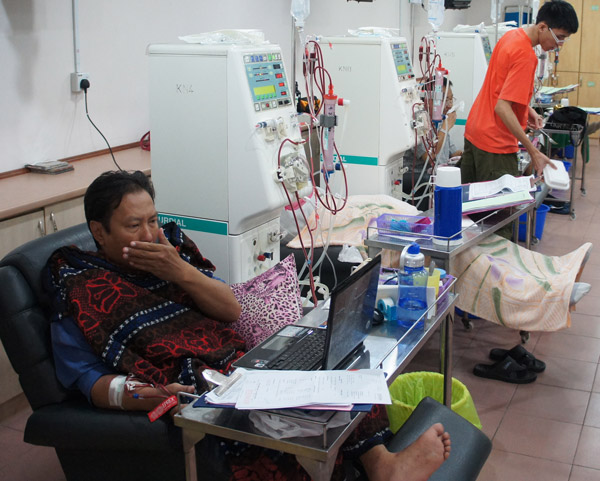KUALA LUMPUR, Feb 4 — The Malaysian Employers Federation (MEF) wants the Social Security Organisation (Socso) to continue subsidising dialysis for workers with renal failure from occupational accidents — without conditions.
This comes after Socso imposed new criteria for insured individuals who want free dialysis treatment from the fund, including that they must now have paid at least 24 months’ worth of monthly contributions to Socso within 40 consecutive months before their invalidity notice is received by the social security fund.
MEF executive director Shamsuddin Bardan said that imposing this condition and others for this group would infringe on their rights, noting that ruptures or damage to the kidney due to industrial accidents or workplace accidents, while not common in Malaysia, do occur.
“MEF is of the view that the matter should be restudied by Socso for the interest of insured persons,” he said. “The decision on eligibility, terms and condition should not be made in a hastened manner.
“Further deliberation and consultation with the stakeholders should be conducted.”
However, he said that MEF does not agree with a trades union that the controversial new requirements in place for the free dialysis treatment contravene the law, saying that the requirement is consistent with the definition of invalidity under Section 7 of the Employees’ Social Security Act (ESSA) 1969.
The head of the bosses group told CodeBlue that the move, in principle, does not contradict the ESSA.
Despite this, Shamsuddin said MEF is of the view that any mechanism used by Socso should be user-friendly to both employers and employees and should not cause disadvantage to rightly deserving insured persons.
“MEF agrees with MTUC (Malaysian Trades Union Congress) that the revised conditions limit, and, in some cases, will outright deny insured persons in receipt of invalidity pension from getting free dialysis treatment,” he said.
Dialysis treatment is provided free-of-charge at any Socso dialysis panel centres, government hospitals, private dialysis centres, or facilities run by non-government organisations (NGOs), but the eligibility for end-stage renal disease patients getting free dialysis covered by Socso is now tied to the respective new applicant’s tenure and quantum of contribution to the fund.
The move prompted harsh criticism from the MTUC, which said the move would limit access or completely deny disadvantaged contributors and beneficiaries free dialysis treatment, which has been provided by Socso since 1999. MCA, on the other hand, has threatened a lawsuit if the circular is not rescinded.
MTUC secretary-general J. Solomon had also claimed that the move contradicts the Employees’ Social Security Act 1969, Section 57(1) of which states that an invalid person suffering from or claiming to suffer from invalidity or permanent disablement may be provided facilities for physical or vocational rehabilitation by Socso for free.
Shamsuddin, meanwhile, urged Sosco to release its December 5, 2019 memorandum titled “Proposed Action Plans to Bridge the Gap Between SOCSO’s Assets and Liability and Improve Fund’s Sustainability” that justified the move.
He said that Socso should share with its stakeholders how much of its funds will be saved by implementing the new conditions, noting it could add tremendous burden on the insured persons and their families.
Information on dialysis treatment is already captured in the annual Sosco report, he said, and cited data to show that a total of 16,321 insured persons benefited from Socso’s free dialysis treatment out of 209,259 new benefit recipients, in its 2017 report. The benefits refer to those arising from workplace injury or invalidity.
“It is, however, suggested that Socso detail out its report on expenses on dialysis treatment as this information is not available in the 2017 annual report.
“Governance and transparency principles mean that Socso needs to share its data on the above and Socso should not keep the stakeholders in the dark especially when the decision negatively impacts the rights of insured persons,” he added.
Socso deputy chief executive (operations) John Riba Marin did not respond to emailed queries by CodeBlue on whether the circular would be retracted, and whether the December 5 memorandum would be made public. Human Resources Minister M. Kulasegaran has yet to respond either, despite repeated calls from opposition leaders.
John previously said that Socso cannot be the only group to provide dialysis as treatment costs are estimated to continue to escalate, and proposed that a solution of the health financing issue be looked at by all health, welfare, and social organisations in the country.








